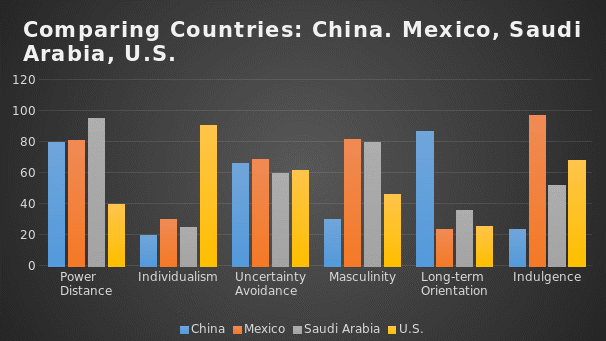Hofstede’s Cultural Dimensions
Conducting cross-cultural communication in the context of the global economic environment is a challenging task. Because of the necessity to take into account a vast range of culture-related factors to avoid cross-cultural conflict, organizations need to carry out a comprehensive comparison of states participating in international interactions (Wilhelm & Chaichompoo, 2015). Created by Geert Hofstede, the Cultural Dimensions Theory and corresponding tool facilitate identifying differences and similarities in the cultural characteristics of different countries. Thus, they provide the opportunity to develop trust-based relationships and avoid cross-cultural clashes (Özdasli, Penez, & Koca, 2016).
Chart Analysis

As Figure 1 shows, a vast number of differences exist across the key dimensions among the United States, Mexico, Saudi Arabia, and China. For example, the level of indulgence varies significantly among the different countries, with Mexico showing the highest rates and China having the lowest. The levels of indulgence are also significantly different in the identified states. For example, Mexico and Saudi Arabia tend to avoid uncertainty quite often, whereas the United States and China are less concerned with the specified issue.
The results of the comparison also show notable points of contact among the various states. For instance, power distance is equally high in all countries except the United States, where it is moderate. Uncertainty avoidance, in turn, reflects similar levels in all countries. By focusing on qualities held in common such as power distance and masculinity, the United States, Mexico, Saudi Arabia, and China will be able to identify common ground and build a constructive dialogue.
Implications of Communication
The outcomes of the analysis indicate the existence of a strong need to introduce a homogenous framework for managing relationships among the United States, Mexico, China, and Saudi Arabia. Because of the differences in culture and worldview exhibited by the specified countries, it is critical to creating a uniform approach toward managing the conversation (Blut, Chowdhry, Mittal, & Brock, 2015). Adopting a negotiation approach based on the principles of compromise and cooperation should be regarded as a primary change that must be implemented to encourage successful business operations between the specified states (Bo, 2014). Introducing a multicultural approach based on the process of unceasing learning and appreciation for the cultures of other states should be considered another crucial step in maintaining stable relationships among the United States, Mexico, China, and Saudi Arabia (Zourrig & Cosentino, 2017). Without a profound study of those issues that have the potential to spark a massive conflict, the participants in an international dialogue will not be able to progress in terms of communication.
Cultural Characteristics
While negotiations based on the avoidance of uncertainty, as well as awareness of power distance principles as one means of communicating with representatives of Chinese, Saudi Arabian, and Mexican organizations, would be expected to have a positive effect on economic and business relationships, it would be incorrect to claim that the adoption of the specified tools would immediately lead to success. However, by taking into account the fact that power distance and uncertainty avoidance play an important role in the cultures of the countries under consideration, the United States will be able to build a connection with them and thus avoid possible confrontations. Furthermore, misunderstandings concerning the intentions of these countries and the organizations that represent them will be managed successfully. As a result, opportunities for successful negotiation will emerge.
References
Blut, M., Chowdhry, N., Mittal, V., & Brock, C. (2015). E-service quality: A meta-analytic review. Journal of Retailing, 91(4), 679-700.
Bo, T. (2014). A study on advertisement translation based on the theory of eco-translatology. Journal of Language Teaching & Research, 5(3), 708-713.
Compare countries. (2018). Web.
Özdasli, K., Penez, S., & Koca, M. B. (2016). The cultural dimension levels of Turks in the United States. Journal of Economic Development, Management, IT, Finance, and Marketing, 8(1), 36-52.
Wilhelm, W. J., & Chaichompoo, P. (2016). We are not like them. They are not like us. Cultural dimensions and moral reasoning in Thailand and the United States. The Journal of Research in Business Education, 57(2), 57-81.
Zourrig, H., & Cosentino, J. (2017). Perceived deceptiveness of insurance fraud: A cross-cultural perspective. ASBBS Proceedings, 24(1), 567-578.